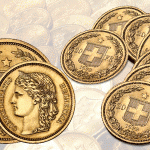Gold fell during the afternoon european session today after the greenback gained strength following disappointing data from Germany. The ZEW index of German economic sentiment rose to 36,4, up from 36,3 in April, but way below expectations of of 38,3. The index of current conditions fell to 8,9 from 9,2 in April, which is a sign that the biggest european economy could struggle to recover from the 0,5% contraction in Q4. This led to a decrease in the value of the Euro, which strengthened the dollar, driving the gold down after starting the day strong and regaining strength.
The U.S. dollar index, which measures the greenbacks performance against six major peers, has risen by 4.1% so far this year amid signs for consistent U.S. economic recovery, while Bank of Japan eased money supply to boost inflation and the European Central Bank cut interest rates to record lows. The greenback tends to trade inversely to dollar-denominated commodities. Strengthening of the dollar makes dollar-priced raw materials more expensive for foreign currency holders and dampens their appeal as an alternative investment.
Huang Fulong, an analyst at CITICS Futures Co., a unit of China’s largest listed brokerage, said for Bloomberg: “Physical buyers backed off when prices neared $1,500 and we expect some of them to come back to the market after the recent price decline. Any rally will be capped if ETF selling continues.”





